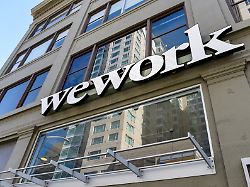Formerly the most valuable US startup
Office space provider WeWork files for bankruptcy
November 7, 2023, 8:20 a.m
Listen to article
This audio version was artificially generated. More info | Send feedback
With clever marketing, WeWork temporarily became the most valuable startup in the USA. During the corona pandemic, offices are emptying because people are working at home. Not a good basis for the office space provider, who can no longer recover from this kink.
The office space provider WeWork, which was once one of the most valuable startups, has filed for bankruptcy in the USA. WeWork wants to reposition itself and, among other things, reduce the amount of office space available. Backers behind around 92 percent of WeWork’s debt have agreed to the plan, the company said.
The idea behind WeWork is to rent office space with shared infrastructure to startups and entrepreneurs in so-called co-working spaces. According to the latest information, the company recently had 660 such locations in 119 cities around the world. In Germany, WeWork is present in Berlin and Frankfurt, among others. In addition to the US bankruptcy filing, one was also filed in Canada. Locations outside of these two countries are not part of these procedures – nor are buildings operated by franchisees.
WeWork shares had already fallen dramatically last week after the Wall Street Journal reported insolvency plans. WeWork actually filed for bankruptcy protection with creditor protection under Chapter 11 of the US Bankruptcy Code. A few years ago, WeWork became a cautionary tale for grossly overvalued US startups and has recently been in trouble again.
IPO already a debacle
As early as August, the company admitted “significant doubts” about its continued existence in view of its losses and expected cash requirements. In September, the first steps were taken to reduce the real estate portfolio. WeWork missed a debt payment due at the beginning of October. That started a countdown of 30 days after the company would have been officially declared insolvent.
Last week, WeWork negotiated a one-week reprieve. Thanks, among other things, to clever marketing by the founders, financiers temporarily helped WeWork achieve a total valuation of up to $47 billion. With this reputation, WeWork wanted to go public in 2019 – but instead of a triumph, there was a flop. The deeper insight into the business in the stock market prospectus caused large investors to avoid the loss-making company.
The debacle at the time was particularly expensive for billionaire Masayoshi Son’s Japanese company Softbank. Softbank and its Vision investment fund, which was backed by Saudi Arabian money, had secured a 29 percent stake in WeWork for nine billion dollars. When the IPO collapsed in 2019, Softbank raised another $9.5 billion to increase its stake to 80 percent and force out the controversial co-founder and boss Adam Neumann. But even under the direction of Softbank, WeWork remained unlucky. During the corona pandemic, offices around the world emptied because people worked at home.
Even after the pandemic subsided, WeWork struggled to fill office space. At the same time, rental costs for buildings had to be paid and debts had to be serviced. In 2021, WeWork made it onto the stock market in a detour – by merging with a blank check company. After the recent price collapse, the value fell to a good $44 million.
